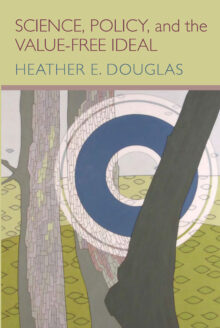
Heather E. Douglas
Heather E. Douglas is professor in the Department of Philosophy at Michigan State University. She received her PhD from the History and Philosophy of Science Department at the University of Pittsburgh in 1998 and has held tenure-line positions since then at the University of Puget Sound, the University of Tennessee, and the University of Waterloo. She is the author of numerous articles on values in science, the moral responsibilities of scientists, and the role of science in democratic societies. Her work has been supported by the National Science Foundation, and in 2016 she was named a fellow of the AAAS. She is editor of the book series Science, Values, and the Public.
Science, Policy, and the Value-Free Ideal
The role of science in policymaking has gained unprecedented stature in the United States, raising questions about the place of science and scientific expertise in the democratic process. Some scientists have been given considerable epistemic authority in shaping policy on issues of great moral and cultural significance, and the politicizing of these issues has become highly contentious.
Since World War II, most philosophers of science have purported the concept that science should be “value-free.” In Science, Policy and the Value-Free Ideal, Heather E. Douglas argues that such an ideal is neither adequate nor desirable for science. She contends that the moral responsibilities of scientists require the consideration of values even at the heart of science. She lobbies for a new ideal in which values serve an essential function throughout scientific inquiry, but where the role values play is constrained at key points, thus protecting the integrity and objectivity of science. In this vein, Douglas outlines a system for the application of values to guide scientists through points of uncertainty fraught with moral valence.
Following a philosophical analysis of the historical background of science advising and the value-free ideal, Douglas defines how values should-and should not-function in science. She discusses the distinctive direct and indirect roles for values in reasoning, and outlines seven senses of objectivity, showing how each can be employed to determine the reliability of scientific claims. Douglas then uses these philosophical insights to clarify the distinction between junk science and sound science to be used in policymaking. In conclusion, she calls for greater openness on the values utilized in policymaking, and more public participation in the policymaking process, by suggesting various models for effective use of both the public and experts in key risk assessments.

